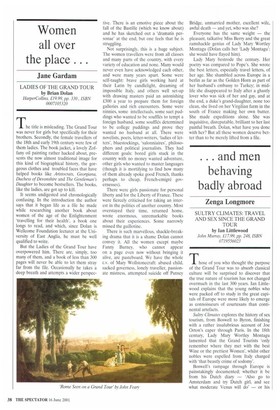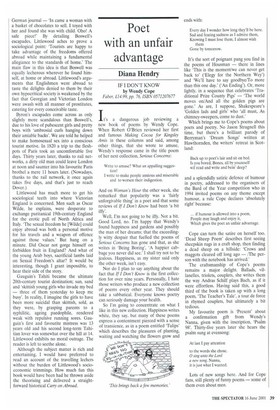S. . and men
behaving badly abroad
Zenga Longmore
SULTRY CLIMATES: TRAVEL AND SEX SINCE THE GRAND TOUR by Ian Littiewood
John Murray, £17.99, pp. 248, ISBN 0719556023
Those of you who thought the purpose of the Grand Tour was to absorb classical culture will be surprised to discover that the true nature of tourism has not changed overmuch in the last 300 years. Ian Littlewood explains that the young nobles who were packed off to study in the great capitals of Europe were more likely to emerge as connoisseurs of courtesans than continental artefacts.
Sultry Climates explores the history of sex tourism, from Boswell to Byron, finishing with a rather insalubrious account of Joe Orton's caper through Paris. In the 18th century, Lady Mary Wortley Montagu lamented that the Grand Tourists 'only remember where they met with the best Wine or the prettiest Women', whilst other nobles were expelled from Italy charged with 'that beastly crime of sodomy'.
Boswell's rampage through Europe is painstakingly documented; whether it be from his Dutch diary — Also go to Amsterdam and try Dutch girl, and see what moderate Venus will do' — or his
German journal — 'In came a woman with a basket of chocolates to sell I toyed with her and found she was with child. Oho! A safe piece!' By detailing Boswell's escapades, Littlewood aches to prove a sociological point: 'Tourists are happy to take advantage of the freedoms offered abroad while maintaining a fundamental allegiance to the standards of home.' The main flaw in this idea is that Boswell was equally lecherous wherever he found himself, at home or abroad. Littlewood's arguments that Englishmen went abroad to
taste the delights denied to them by their own hypocritical society is weakened by the fact that Georgian and Victorian London were awash with all manner of prostitutes, catering for every conceivable taste.
Byron's escapades come across as only slightly more scandalous than Boswell's, due to his love of pubescent girls and pretty boys with 'ambrosial curls hanging down their amiable backs'. We are told he helped to make homosexual sex into a conscious tourist motive. In 1820 a trip to the fleshpots of Paris took an uncomfortable five days. Thirty years later, thanks to rail net works, a dirty old man could leave London at noon and saunter into his favourite Paris brothel a mere 11 hours later. (Nowadays, thanks to the rail network, it once again takes five days, and that's just to reach Dover.) Littlewood has much more to get his sociological teeth into where Victorian England is concerned. Men such as Oscar Wilde, he explains, were desperate to exchange puritanical 19th-century England for the erotic pull of North Africa and Italy. 'The sexual freedom he [Wilde] could enjoy abroad was both a personal motive for his travels and a weapon of offence against those values.' But hang on a minute. Did Oscar not gorge himself on forbidden fruit in England? And what of the young Arab boys, sacrificial lambs laid on Sexual Freedom's altar? It would be interesting, though I grant impossible, to hear their side of the story.
Gauguin's Tahiti became the ultimate 20th-century tourist destination; sun, sand and 'skittish young girls who invade my bed
— three of them yesterday to keep me busy'. In reality, I imagine the girls to have
been more suicidal than skittish, sold, as they were, by grasping parents to a syphilitic, ageing paedophile, rendered weak with repulsive running sores. Gau guin's first and favourite mistress was 13 years old and his second long-term Tahi tian lover was somewhat over the hill at 14. Littlewood exhibits no moral outrage. The reader is left to seethe alone.
Although the subject matter is rich and entertaining, I would have preferred to read an account of the travelling lechers without the burden of Littlewood's socioeconomic trimmings. How much fun this
book would have been had he thrown aside the theorising and delivered a straightforward historical Cany on Abroad.



































































 Previous page
Previous page